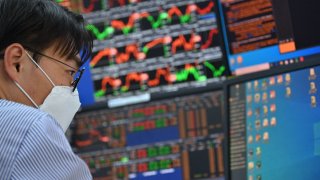
- While consensus among central bank policymakers remains that higher inflation is transitory, the result of a confluence of surging energy prices and global supply problems, investors have begun to seek protection, with major stock markets snapping multi-month winning streaks in September.
- The return of higher and less stable inflation across major economies would cause a spike in exchange rate volatility, and the depreciation of currencies in countries with the highest inflation prints, according to Jonas Goltermann, senior markets economist at Capital Economics.
Markets have been gripped in recent weeks by the debate as to whether higher inflation is here to stay, and analysts have suggested the outcome could have significant repercussions for currency markets.
The 10-year U.S. Treasury yield hit a recent high of 1.56% last week as key inflation data showed consumer prices spiking to multi-year highs in the U.S. and the euro zone.
While consensus among central bank policymakers remains that higher inflation is transitory, the result of a confluence of surging energy prices and global supply problems, investors have begun to seek protection, with major stock markets snapping multi-month winning streaks in September.
Get Tri-state area news and weather forecasts to your inbox. Sign up for NBC New York newsletters.
The return of a regime of higher and less stable inflation across major economies would cause a spike in exchange rate volatility, and ultimately the depreciation of currencies in countries experiencing the highest inflation prints, according to Jonas Goltermann, senior markets economist at Capital Economics.
"Although the near-term relationship between inflation differentials and exchange rates is weak, over longer time horizons countries with relatively high inflation tend to experience depreciation of their nominal exchange rates," Goltermann highlighted in a research note last week.
Money Report
"Indeed, on a long enough period, this effect often dominates other factors affecting exchange rates, such as relative productivity and terms of trade."
The last two decades have been marked by low and stable inflation in many developed markets, in contrast to a period of high inflation in the 1970s and 80s in which a greater disparity occurred across geographies.
Goltermann noted that in general, nominal exchange rates weakened over that period in countries with higher inflation, but when central banks tightened policy in response, it led to temporary but significant appreciation. Exchange rate volatility was notably higher across the major currencies than in recent years.
Nominal exchange rates indicate the value of foreign currency in exchange for a unit of domestic currency, while real exchange rates show the value of a country's goods and services in exchange for those of a foreign country.
U.S., UK, Canada and Australia
Capital Economics holds a similar view on the outlook for inflation to Wharton finance professor Jeremy Siegel, who told CNBC on Friday that inflation is going to be a "much bigger problem than the Fed believes."
Goltermann projected that among developed economies, the U.S., U.K., Canada and Australia are "more at risk of sustained higher inflation."
"This suggests to us that their currencies will weaken in nominal terms relative to the currencies of many European and Asia economies, where we expect inflation to remain subdued."
In emerging markets, Goltermann suggested that Brazil, Colombia, South Africa, Indonesia and the Philippines are at risk of an inflation pickup and currency depreciation, joining the likes of Argentina and Turkey, which have already endured several years of double-digit inflation.
Along with this longer-term deterioration, volatility would likely pick up due to added uncertainty over inflation outcomes and monetary policy responses, producing more significant swings in currency markets, he said.
"Our base case is that most policymakers will continue to keep real interest rates low in order to boost economic growth and to reduce high debt levels gradually," Goltermann said.
"But to the extent that some central banks attempt to bring inflation down through tightening policy significantly, that could generate more significant volatility."






